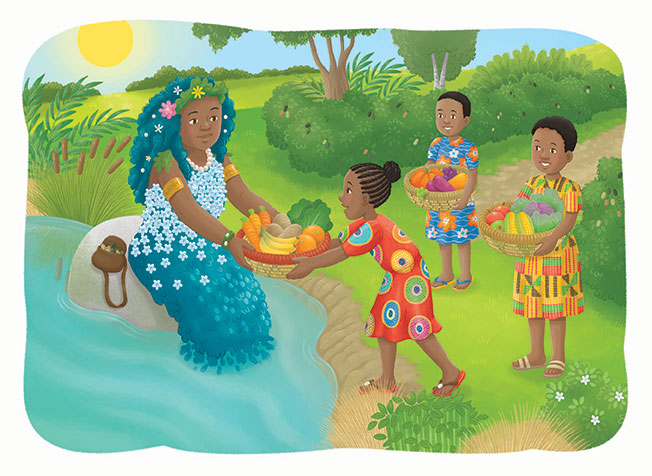Every year, in December, it was time for the Kwanzaa festival – a time when families met and shared food and gifts. And every year, before dawn, Khwezi, Lubo and Malaika would get up and go down to the river. On their way, they would sing beautiful songs and pick blackberries. The three girls were always very excited, because on this day, they would find the water princess, Nobukhwebezane, waiting for them at the river. As they got closer, they could hear her beautiful voice singing:
“Africans arise … Kwanzaa has come!
We give each other beautiful gifts … we show each other love!
Bring fruit, meat and amahewu.
Let’s eat, celebrate together … show each other love!”

The girls would sit on the riverbank and listen to the song. Then, at sunrise, Nobukhwebezane would give them baskets full of vegetables and fruits to take home to their village.“Stay well, Water Princess!” they would call as they ran home so that the villagers could prepare a feast for the Kwanzaa celebrations. But something always troubled Nobukhwebezane. “I wonder why those girls don’t thank me when they take the baskets of fruits and vegetables?” she asked herself as she sat alone.
Back at the village, everyone would gather at the chief’s home, wearing bright, colourful clothes. Besides the fruits and vegetables from the water princess, the villagers would bring grain and meat, and they would cook together while the children played. After the villagers had feasted, they exchanged gifts, and sang and danced. The older people took turns telling their favourite folktales.
One year, when Kwanzaa arrived, Khwezi, Lubo and Malaika woke up and rushed to the river as usual, singing and picking blackberries along the way. As they neared the river, they realised that something was wrong. They couldn’t hear Nobukhwebezane singing. “Could Nobukhwebezane still be asleep?” wondered Malaika. “Maybe she’s not well,” suggested Khwezi.
“Perhaps she forgot that today is the start of Kwanzaa,” said Lubo.
When they reached the river, Nobukhwebezane was nowhere to be seen.
Suddenly, a bright light blinded their eyes. Then, a loud and frightening voice said, “Whoever is given something must say thank you! That is good manners!” Then the light disappeared, and only the rising sun behind the hills in the distance remained. The girls felt terrible when they realised what they had forgotten to do.
“We never thank Nobukhwebezane for the Kwanzaa gifts! We always leave in a hurry,” said Lubo sadly. With heavy hearts, they slowly started walking back home.
“What are we going to say when we arrive back at the village empty-handed?” asked Malaika.
Khwezi turned to her friends and said, “Friends, … we must go back and apologise to the water princess.”
“But Nobukhwebezane doesn’t want anything to do with us. She doesn’t want to see us!” said Lubo, feeling hopeless.
“I agree with Khwezi,” said Malaika. “We have to go back and apologise. Even if we don’t find Nobukhwebezane there, we can leave a message for her with the fish.”
“Good idea,” said Lubo, starting to feel better. “I know, on our way back to the river, we can pick blackberries as a gift for Nobukhwebezane.”
The three girls picked a bag full of blackberries. Their faces were smiling again as they ran back down to the river. As they got closer, they heard the sweet song they knew so well:
“Africans arise … Kwanzaa has come!
We give each other beautiful gifts … we show each other love!
Bring fruit, meat and amahewu.
Let’s eat, celebrate together … show each other love!”
“Nobukhwebezane is back! The water princess is back!” they shouted, running to the edge of the river.
Nobukhwebezane was sitting on a rock close to the riverbank, smiling.
“Princess, we are really sorry for never saying thank you for your gifts of fruits and vegetables!” said Malaika.
“Yes, Nobukhwebezane, we apologise. Please forgive us,” begged Khwezi.
“Kwenzaa is a time for giving gifts. Today we have a gift for you!” said Lubo, reaching out to give Nobukhwebezane the bag full of blackberries.
Nobukhwebezane looked inside the bag and smiled. “These blackberries look delicious. Thank you, friends!”
“We are also thankful to you, Princess, for the gifts that you have given us year after year at Kwanzaa. Thank you,” Malaika said shyly.
“My friends, … Kwanzaa is a time of giving, joy, peace and love! Come close, I want to teach you a new song!” Then Nobukhwebezane sang:
“Always be thankful, always love and you will receive in return!
Always be thankful, always love and you will receive in return!
Always be thankful, always love! These are always good!”
“Now, hurry home,” she said. “It’s getting late! Here are the baskets of fruits and vegetables. They are waiting for you.”

“Thank you, Water Princess. Thank you, Nobukhwebezane!” said the girls.
“Go well! Happy Kwanzaa!” shouted Nobukhwebezane.
“To you too, Princess! Thank you!” shouted the girls.
When the girls arrived home, the villagers were already waiting for them. “Thank you, girls. It looks like you brought more fruit and vegetables than ever before. Thank you!” said the chief of the village.
When the girls heard this, they looked at each other … and smiled. They knew that Nobukhwebezane had forgiven them. “Thank you, Princess,” they whispered.
Get story active!
- Does your family or community take part in a celebration that is specifically African or South African? What is it called and what is celebrated?
- What kinds of fruits and vegetables do you often have at your celebrations? Draw some of these fruits and vegetables.
- Make up your own song in which you say thank you for the good things that you receive each day.

